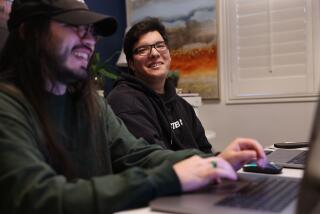Declaration of Independence : Job Training Program Liberates Quadriplegic by Giving Him Tools for Autonomy
- Share via
The people who have most recently come into Steven Price’s life would be amazed to learn that two years ago, this ebullient, outgoing man was virtually a shut-in.
They’d find it hard to picture him spending day after day sitting in front of the television set in his pajamas--bored, lonely and depressed.
Price can’t see himself living like that, either. Not anymore. But there was a time when the wheelchair-bound La Habra resident didn’t believe he had a choice.
Price, a quadriplegic who has been severely disabled by cerebral palsy since birth, says he grew up learning more about his limitations than his potential. He wasn’t able to live on his own after he graduated from Troy High School in Fullerton, so he remained at home under his father’s care. Although he went to college for three semesters and tried some volunteer work, he reached his late 20s without finding any way that he could feel productive.
Price, whose mother died 11 years ago, recalls some days when he’d get so frustrated and angry that he’d start throwing things. And, he says, he felt so hopeless during one bout of depression that he contemplated suicide.
“From the time I got up in the morning till I went to bed, I didn’t like anything. I had no purpose,” he says. “I struggled even to find a friend I could talk to.”
But today, at 29, Price has a sense of purpose and a circle of friends. He even has a nickname--”Smiley”--which reflects the dramatic change in his life that has resulted from his involvement with Project Independence, a private, nonprofit organization that helped him discover he is capable of doing far more than he ever imagined.
Price is one of more than 100 disabled adults in Orange County who now hold paying jobs obtained through Project Independence’s state-funded employment placement and training program.
The Anaheim-based organization provides coaches who help adults with developmental, neurological and physical disabilities do whatever is necessary to get and keep a job.
The coaches guide people through the job interview process, teach them how to get to and from work on their own, help them shop for work clothes and improve their social skills, train them at the work site and then provide close supervision or follow-up services as needed. (For more information, call (714) 772-5061.)
Lisa Berger, director of employment services for Project Independence, says the employers who hire workers through the program are not just trying to help the disabled. They’re paying to get a job done, and they aren’t asked to make allowances for anyone who falls short of their expectations.
The coaches from Project Independence are there to help disabled workers overcome any hurdles that might hinder their success. But some do so well that they need little guidance once they’ve mastered the job.
Job coach Kim Yokoyama supervises Price and three other Project Independence workers at the Pace Membership Warehouse in Fullerton, and she says Price is “basically on his own--he’s that independent.”
On Friday, Price will proudly celebrate his first anniversary in a $5-an-hour job that has, as he puts it, “become my life.”
Every weekday from 9 a.m. to 1 p.m., he serves as the store’s official greeter, giving customers a broad smile and a friendly “welcome,” making sure they have a membership card and keeping a count that determines how many check-out stands will be opened.
At first, warehouse director Jake Jacobi assigned another employee to stand at Price’s side in case there were any questions or problems with customers. But Price, who has a slight mental impairment but is known among co-workers for his sharp memory and sense of humor, now mans his post without any assistance.
Jacobi has nothing but praise for his performance: “He’s on the payroll, and he’s worth every penny.”
Adds Salvatore Pierro, a co-worker and friend of Price’s: “He does a hell of a job. He’s well-liked by customers and fellow workers. We look out for him, and he looks out for us.”
Pierro notes that Price made a big impression on his co-workers when he began recognizing their birthdays and anniversaries with greeting cards. He buys them himself at Brea Mall, where he transfers from one bus to another on the way home from work. That’s no small feat for a man who says he had never ridden a bus or made a purchase by himself until he landed his first job at 28.
It took Price six months to find his job at Pace Warehouse. While he searched for work with the help of a Project Independence coach, he received lessons on how to operate independently in the community. During outings with the coach and several other disabled people, for example, he learned how to use the bus system and the library, how to get around a mall and how to grocery shop.
This was all new ground for Price, who says the people closest to him have always tended to do too much for him.
“I was too sheltered. I didn’t have the opportunity to be independent,” Price says.
Berger points out that many disabled people receive more help than they need from well-meaning loved ones.
“Family members see how much assistance they need, and it’s hard to look beyond that,” she explains. “They look at disabilities instead of abilities.”
Many families also feel isolated and don’t know where to turn for help, she adds.
Roger Price says he’s delighted that his son found Project Independence. He admits that he’s been surprised by the steps Steven has taken toward independence.
“It’s really been good for him,” Roger says. “He didn’t have anything to do before, and that finally got to him. He wanted to feel like he belonged somewhere.”
Steven Price feels that strongly now. He says the friends he’s made through his job are “extremely supportive,” and he likes being in a position that gives people a chance to let him know they care.
“When I sit out there, I feel like I’m in the spotlight. Everyone asks, ‘How are you?’ They want to know about me, and I’m proud of that.”
When he started the job, however, he was afraid he would get bored because he didn’t have enough to do. “But then people started interacting and greeting me and I thought, ‘I’m going to like this. It’s going to get better and better.’ And it has. “I was thinking more about the boredom than what I could get out of (the job).”
Once he began to look at his job more positively--and saw what a difference it made in his performance--he realized he may have been hindered in the past by his own negative thinking.
“I look for advantages rather than disadvantages now. Before, I didn’t ever see advantages,” he says.
With help from Project Independence, Price plans to keep moving toward greater autonomy. For example, he notes, he recently asked his father to rearrange the kitchen so he could reach what he needs to make his own lunches and snacks. And he’s learned to use the microwave in the employee lounge at Pace Warehouse, where he often eats lunch with co-workers.
Berger says that someday, Price might be a candidate for Project Independence’s Community Living Skills program, which helps disabled people learn how to fend for themselves in their own apartment.
“We’re looking at his whole life and assisting him in becoming an independent person,” Berger says. “As long as he’s learning and growing, we’re here to help him.”
Price is happy to have that support, but he’s become very selective about the kind of help he will accept.
“I have a desire to do more for myself now,” he explains. “I won’t allow other people to help me unless I ask. I have more authority.”
He has ambition too.
Someday, he says, he’d like to have a job that involves working with computers: “I picture myself behind a desk one of these days being able to operate a computer fast enough to where it’s acceptable.”
Only recently has he begun to think this way. After years of grappling with limits, Price has finally begun to focus on possibilities.
More to Read
Sign up for Essential California
The most important California stories and recommendations in your inbox every morning.
You may occasionally receive promotional content from the Los Angeles Times.





![Vista, California-Apri 2, 2025-Hours after undergoing dental surgery a 9-year-old girl was found unresponsive in her home, officials are investigating what caused her death. On March 18, Silvanna Moreno was placed under anesthesia for a dental surgery at Dreamtime Dentistry, a dental facility that "strive[s] to be the premier office for sedation dentistry in Vitsa, CA. (Google Maps)](https://ca-times.brightspotcdn.com/dims4/default/07a58b2/2147483647/strip/true/crop/2016x1344+29+0/resize/840x560!/quality/75/?url=https%3A%2F%2Fcalifornia-times-brightspot.s3.amazonaws.com%2F78%2Ffd%2F9bbf9b62489fa209f9c67df2e472%2Fla-me-dreamtime-dentist-01.jpg)







